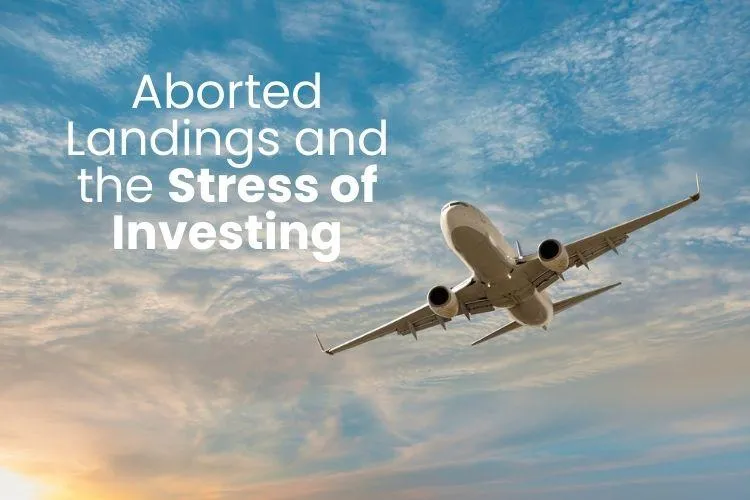

VISION HEALTH ARTICLES

Aborted Landings and the Stress of Investing
Let’s pretend you are going on a plane ride. You board the plane feeling good. It is your choice, you know where you are going, and you feel confident in the airline’s pilot training. You are in control and have a feeling of high certainty. The plane takes off, and you’re airborne. Although you still feel a high degree of confidence and certainty, you realize you have to relinquish yourself to your prior decision because you no longer have control.
All goes well until the plane begins its descent and experiences a large amount of turbulence. The person sitting next to you begins to pray; other people are screaming. As the pilot makes the approach, he cannot land the plane, and the landing must be aborted. You are now experiencing low certainty, and you have no control of the situation. In other words, you are freaking out.
The pilot eventually lands the plane, and as it taxis to the gate, you move back to feeling highly certain that you will survive. You feel like you are going to be in control again. As you step off the plane, you think to yourself, “I will never get on another plane as long as I live.”
But here is the thing: you need to—and will—fly again. After all, it’s a modern miracle. You may have walked away from your flight feeling scared, traumatized, and ready to condemn flying for the rest of your life, but what about the pilot? In terms of certainty and control, where was he during the flight?
You see, the pilot’s experience was much different than yours. He didn’t experience an aborted landing; he experienced what is called a go-around. He was operating in a quadrant of low certainty but high control. The pilot knew he couldn’t stop acts of God, extreme weather, or freak accidents, but he did control his training, aircraft maintenance, and other risk-management protocols. His training enabled him to understand what was happening and take action to ensure the passengers’ safety.
Now, this doesn’t make the pilot superior. He just has a unique perspective. Realizing this makes it easier for you to focus on the things that matter more in life and to trust that good pilots will get you to where you need to go safely, even if they occasionally need to do a go-around.
So here is my tip for you to have a better investing experience. The stock market is like flying in a plane. Although there are inherent risks that can have real and life-changing effects, statistical records show it to be a generally safe mode of transportation, where the efficiency and benefits often (but not always) outweigh the risks.
I also offer this unexpected idea: your investing pilot doesn’t have to be your “financial guy.” Your pilot can just as easily be your financial plan. The key is to write it down and stick to it.
Regardless of who your pilot is, the worst thing to do is storm the cabin or swear off flying. It’s going to be a turbulent ride, so put your hands up and learn to love it like your favorite Disney roller coaster, and your life will likely become exceedingly happier.
Information presented is for your educational purposes only and should not be regarded as a complete analysis of the subjects discussed. Discussions and answers to questions do not involve the rendering of personalized investment advice, but are limited to the dissemination of general information. A professional advisor should be consulted before implementing any of the options presented.
Encompass More Asset Management LLC is a registered investment adviser with the U.S. Securities and Exchange Commission (SEC) and only transacts business in states where it is properly registered, or is excluded or exempted from registration requirements.
